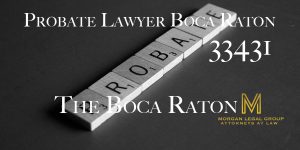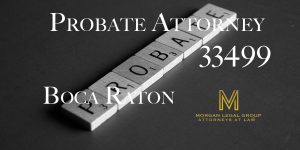Demystifying the Probate Process: A Guide by Morgan Legal Group
When navigating the complexities of estate planning and probate, understanding what information becomes publicly available is crucial. At Morgan Legal Group, Miami, we believe in empowering our clients with comprehensive knowledge to make informed decisions. This post aims to shed light on the public aspects of the probate process, ensuring you are well-prepared for what lies ahead.
The Basics of Probate and Public Accessibility
Probate is the legal procedure by which a deceased person’s will is validated, and their assets are distributed under court supervision. It involves several steps, from validating the will to distributing assets to beneficiaries. A significant part of this process, including filing of the will, inventory of the deceased’s assets, and notices to creditors and beneficiaries, becomes a matter of public record. Understanding these public records is essential for beneficiaries, creditors, and estate planners alike.
Public Records in the Probate Process
Public records in the probate process include the deceased’s will, inventory of assets, and any claims by creditors. These documents offer insight into the estate’s value and how it will be distributed. For individuals planning their estate, awareness of this public disclosure can influence decisions on creating trusts or other mechanisms to maintain privacy.
Why Public Access Matters
Public access to probate records serves multiple purposes. It ensures transparency in the distribution of assets, allows creditors to file claims against the estate, and provides a way for interested parties to challenge the will if necessary. However, for many families, this public exposure raises concerns about privacy. This is where strategic estate planning comes into play, offering ways to limit the amount of information that becomes publicly accessible.
Strategies to Protect Privacy in Estate Planning
At Morgan Legal Group in Miami, we specialize in crafting estate plans that respect your privacy while ensuring your wishes are honored. Utilizing trusts, for example, can help bypass the probate process, keeping your estate matters confidential and out of public records. Other strategies include designating beneficiaries on accounts to avoid probate and employing business entities to hold assets.
The Role of Legal Guidance in Navigating Public Records
Understanding and navigating the probate process and its public records can be daunting. This is where professional legal guidance becomes invaluable. Experienced estate planning attorneys can help devise strategies that align with your privacy preferences and legal requirements, ensuring a seamless transition of your assets to your loved ones.
Conclusion: Empowering Your Estate Planning Journey
While the probate process involves public disclosure of certain information, strategic estate planning can help maintain your privacy. At Morgan Legal Group in Miami, we are committed to guiding our clients through these complexities, ensuring that your legacy is protected and passed on according to your wishes. Understanding the public aspects of probate is just the first step in a well-planned estate strategy. Let us help you navigate this journey with confidence and peace of mind.
Contact Morgan Legal Group today to explore how we can assist you in your estate planning needs, ensuring a legacy that reflects your wishes and values, all while navigating the intricacies of the probate process with ease.








